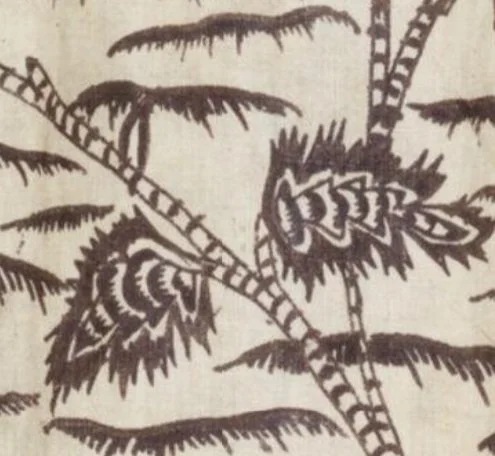18th century garments in monochrome prints
Brilliant multicolor designs dazzle the eye on 18th century printed textiles, but what about single-color prints? Monochromatic prints often appear on printed handkerchiefs, but they were also used on a lot of other garments, including ladies’ gowns and men’s waistcoats. They also turn up in scraps used on housewifes and patchwork pockets.
Single-color printing was a less-expensive process, so many (but not all!) of the garments produced in monochromatic prints were less expensive to produce. While these monochrome print garments may have been just as prevalent than their polychromatic equivalents – or even moreso – they may have been worn out completely, or less desirable for collection and preservation in subsequent years.
I’m grouping these examples of 18th century clothing by the color of the print (and then arranging them roughly chronologically within the color category). Many of these are block prints, but some of the more detailed designs are in plate (or copperplate) prints. It's also possible that some of these prints have aged into another color (especially with the brown and black prints below).
Additional Resources
Of the Callico-Printer, The London Tradesman (1747)
Identifying Printed Textiles in Dress 1740-1890
Printed Textiles: English and American Cottons and Linens 1700-1850
Black
Zuiderzeemuseum Enkhuizen 1965-10-14, an 18th century under-petticoat from Zaanstreek
Nederlands Openluchtmuseum HM.8039, an unfinished petticoat made of cotton with an English East India Company import stamp
Rijksmuseum BK-1982-80-A, a banyan, c. 1750-1799
V&A IS.105-1950, a woman’s chintz jacket, Friesland, c. 1775-1780
Christie’s Sale 5473, Lot 41M, an English waistcoat, 1790s
Blue
Winterthur 1960.0248, an English pocket, c. 1720-1730
A swatch captioned “a blue & white linnen long sack 1748” in the Barbara Johnson album
Met C.I.37.2, an American bedgown, c. 1750-1775
Manchester 1972.110, an English bedgown, 1760-1780
Historic New England 1998.5875, dress worn by Deborah Sampson, 1760-1790
A swatch captioned “a Blue & White Copper-plate linnen Gown. eight yards Three shillings a yard August 1764:” in the Barbara Johnson album
KCI AC7621 92-34-2AB, a French robe à la française, 1770s
Image courtesy of Manchester Art Gallery
Brown
V&A IS.18-1950, a chintz wentke, Hindeloopen, first quarter of the 18th century
Winterthur 1969.4671, an English or French bedgown, 1715-1725
Colonial Williamsburg 2023-136, the lining of a bed quilt later turned into a quilted petticoat, made in Philadelphia c. 1735-1750
PVMA 1915.18.05, a pocket, c. 1750-1800
Fries Museum T1956-436, a handkerchief, c. 1775-1799
Colonial Williamsburg 1985-242, the lining of an English bedgown, c. 1775-1815
National Trust 1348736, a copperplate printed dress in toile de Jouy with scenes from the Odyssey, c. 1785-1795
Centraalmuseum 7809, a petticoat in toile de Jouy with scenes from The Deserted Village and the Judgment of Paris, c. 1790-1800
Purple
A swatch captioned “Purple and white linnen Gown: eight yards half a Crown a yard. Made by Mrs Grey November 1763” in the Barbara Johnson album
Colonial Williamsburg 1993-338, an English waistcoat, c. 1770-1785
A swatch captioned “a purple and white copper-plate linnen Gown. seven yards 3 - 2 a yard. Northampton May 1771” in the Barbara Johnson album
London Museum 39.5/34, c. 1771-1780; “made of linen printed in purple with a floral design of acorns on stems.”
A swatch captioned “a purple and white linnen Gown. eight yards. three shillings a yard. 1779” in the Barbara Johnson album
Colonial Williamsburg 1992-139, an English child’s dress, c. 1785-1810
Red
National Trust 814614.11, a doll’s gown, c. 1740-1760
Printed-to-shape waistcoats on linen turned into a coverlet (fig. 4.7 in For the heat is beyond your conception)
Fries T1957-450, a house dress or contouche in white linen printed with a red design, c. 1750-1799
A swatch captioned “two red & white linnen short sacks, 1754: 2 = 4 a yard” in the Barbara Johnson album
Colonial Williamsburg 1958-241, an English doll’s dress, c. 1770-1780
A swatch captioned “a Red and white Chintz. Gown and Petticoat. Ten yards. yard wide. three shillings a yard. May 17” in the Barbara Johnson album
V&A T.29-1966, c. 1775-1785
Yellow
A swatch captioned “a yellow and white strip’d linnen Gown, eight yards, three shilling a yard, made at Stamford” in the Barbara Johnson album
Green
A swatch captioned “November 1763: a green & white yard wide Stuff night-gown, seven yards, twenty pence a yard” in the Barbara Johnson album






